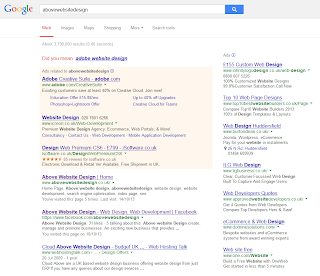Also referred to as web indexing or internet indexing is quite a complex topic. However I feel it is one of the easier on-line topics to explain on a basic level as many of the terms used conjure up mental images that help me remember how it all works.
As website indexing implies it is about getting a website indexed or listed on search engines and the results they provide.
The usual goal is to try to get a website indexed at the first position available when the search engine returns the results back to you after search for whatever you have typed in search box. Quite often this doesn't mean that you will be listed on the top of the page as many search engines will have paid for advertised links at the top of the page, however it does usually mean that you will be found on the first page (directly under the paid results).
So how does the search engine decide which page gets listed where? Well there is no straight forward answer to this as search engines have unique 'algorithms' that set the criteria as to what makes a good website.
When you try to get your website on top of the page listings or index it requires a bit of trial and error, and not everything that works for one website will work for the next, which can be frustrating and opened the debate of whether search engine optimisation of a website is an art or a science? (but that's for another blog!)
There are however certain things we know about how a website gets 'indexed' and if you have a website these are the least things that you need to do to ensure your site gets indexed and moves up the 'listings'
Here's what we know for sure:
Search engines like Google, Bing, Internet Explorer, Zafari, and so on....Use something called 'Web Crawlers' to gather information relating to a website. These web crawlers may gather information from many areas of your website but tend to use your websites 'keywords' and 'meta data' to add to the search engines search criteria (or to match to what someone searches for).
So it is important that your website has the correct terms and keywords in use enable the search engines to list or index your site where it should be when it is searched for.
Although search engines take into account many other factors including site age, site popularity, up to date coding, site usage (content management), and so on, to insure your site gets positioned on the index or page rankings correctly, the meta data and keywords are something you should like to get right from the very beginning.
(If your getting lost with the terms already don't worry because we will explain and link from them in future posts.)
If you require a website why not visit our commercial website Above Website Design. We are specialists in getting small businesses on the World Wide Web.
As website indexing implies it is about getting a website indexed or listed on search engines and the results they provide.
The usual goal is to try to get a website indexed at the first position available when the search engine returns the results back to you after search for whatever you have typed in search box. Quite often this doesn't mean that you will be listed on the top of the page as many search engines will have paid for advertised links at the top of the page, however it does usually mean that you will be found on the first page (directly under the paid results).
So how does the search engine decide which page gets listed where? Well there is no straight forward answer to this as search engines have unique 'algorithms' that set the criteria as to what makes a good website.
When you try to get your website on top of the page listings or index it requires a bit of trial and error, and not everything that works for one website will work for the next, which can be frustrating and opened the debate of whether search engine optimisation of a website is an art or a science? (but that's for another blog!)
There are however certain things we know about how a website gets 'indexed' and if you have a website these are the least things that you need to do to ensure your site gets indexed and moves up the 'listings'
Here's what we know for sure:

Search engines like Google, Bing, Internet Explorer, Zafari, and so on....Use something called 'Web Crawlers' to gather information relating to a website. These web crawlers may gather information from many areas of your website but tend to use your websites 'keywords' and 'meta data' to add to the search engines search criteria (or to match to what someone searches for).
So it is important that your website has the correct terms and keywords in use enable the search engines to list or index your site where it should be when it is searched for.
Although search engines take into account many other factors including site age, site popularity, up to date coding, site usage (content management), and so on, to insure your site gets positioned on the index or page rankings correctly, the meta data and keywords are something you should like to get right from the very beginning.
(If your getting lost with the terms already don't worry because we will explain and link from them in future posts.)
If you require a website why not visit our commercial website Above Website Design. We are specialists in getting small businesses on the World Wide Web.


No comments:
Post a Comment